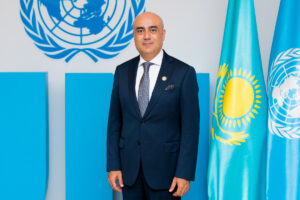We are living in turbulent and uncertain times. The COVID-19 pandemic, the geopolitical crisis, the climate change, and ecological disasters threaten the world daily. Where do we go for a more hopeful future? How do we find new paths? And what is standing in the way of us moving there? The new Human Development Report “Uncertain Times, Unsettled Lives: Shaping our Future in a Transforming World”, seeks to address these questions.

Sukhrob Khojimatov.
The Report claims global development has stalled. Until 2020, the global Human Development Index (HDI) – a measure of a nation’s health, education, and average income – had risen every year since 1991 when UNDP began calculating it. It fell in 2020. And it fell again in 2021. And it fell almost everywhere: 90 percent of countries saw a decline in one or other year, wiping out five years of progress.
Over the past three decades (1990-2020), Kazakhstan has been able to increase its HDI by 20 percent and joined the group of countries with a very high level of human development. Yet, the 2019 Inequality-Adjusted HDI and 2020 Planetary-Pressure Adjusted HDI showed Kazakhstan may worsen its position if it fails to address systemic inequalities and tackle central challenges of the Anthropocene.
Development today, with its new dimensions of uncertainty, is the focus of UNDP’s Human Development Report 2022. The report is the third and final installment in a trilogy or reports including the 2019 report on inequalities and the 2020 report on the risks of the Anthropocene. The Report examines the ways in which crises are piling up to unsettle life, and interacting with our changing planet, increasing polarization and societal transformation. These are all moving at unprecedented speed and scale and interacting with each other in ways we cannot ignore.
An obvious example is humanity’s impact on planetary processes, from melting glaciers to dwindling wildlife. In Kazakhstan, more than 50 percent of the current glacier mass is expected to be lost by 2100; climate-related disasters such as mudflows, floods, forest fires, and droughts have increased in frequency and scale, a trend expected to continue in the next decade. Climate change is projected to cause a steep decrease of water resources (up to 22 percent) by 2100, leading to water stress in all the country’s eight basins.
For the first time in history, manufactured materials, such as concrete and asphalt, outweigh the Earth’s biomass. Microplastics are everywhere: in country-sized garbage patches in the ocean, in protected forests and distant mountaintops, in people’s lungs and blood. This is threatening humanity’s very survival.
Yet we have solutions to turn the situation around. But insecurity, mistrust and polarization stand in our way to rise to these challenges. The report shows that trust in one another is at its lowest recorded level, coming in at just 30 percent. In many countries this erosion of trust pushed people to extreme positions, making it even harder for a society to take collective action.
But this can be reversed. We must set a new course by defusing polarization, rebuilding trust, and allowing everyone to be part of decision-making. The human forces must be reoriented to save our world, working with and not against nature. Our success will depend upon humanity’s ability to take decisive action, and to prioritize policies that invest, insure, and innovate.
These policies will enable people to thrive in the face of uncertainty. Investment — from renewable energy to preparedness for pandemics and extreme natural hazards— to ease planetary pressures. Insurance — including social protection — to prepare our societies for the contingencies of an uncertain world. Innovation in its many forms—technological, economic, cultural—to respond to the unknown challenges that humanity will face.
There is already progress to cheer from the dramatic increase in wind and solar energy. With serious investment this could rapidly accelerate and ensure global accessibility. In Kazakhstan, currently there are 134 operating renewable energy plants with total capacity of 2010 MW. In 2021, the increase in electricity generation by renewable energy facilities grew by 30 percent compared to 2020. Yet, to meet the national target of 15% of the share of renewable energy sources more than 3 trillion tenge are still to be invested.
As investment ramps up, people also need to feel safe. Alongside insurance for companies and countries, social protection should be the bedrock of our societies. It provides an essential stabilizing force in the face of uncertainty. Focus on those that are mostly left behind – people with disabilities, people in informal or other precarious employment, youth, and women – will help society stay resilient when exposed to shocks and crises. A good example is a digital tool like Family Social Card, recently piloted in Kazakhstan with UNDP’s support, allowing to proactively identify families and individuals at most risk and tailor a consolidated whole-of-government approach to ensure they receive necessary services.
However, it is innovation that will be at the epicentre of us conquering the unknowable challenges ahead. As a key enabler for sustainable development according to UNDP’s strategic plan, innovation helps empower governments and communities to enhance the performance of entire systems, making them adaptive and resilient. In Kazakhstan, UNDP harnesses the digital solutions to amplify development outcomes across all portfolios and thematic areas of work. From the Digital Portal of Social Services to accelerating digital transformation in the public sector, from introducing satellite telemetry for wildlife monitoring to closing the digital gender gap in the monotowns of Kazakhstan we are supporting the country in building an inclusive and sustainable digital society.
We all understand that the only certainty today is that our future is uncertain. To thrive together, we must throw out the old rulebook and recognize the world has changed. It is time to rekindle hope and re-write the future. To decide that this is not the end of humanity, but the start of a new beginning, full of opportunities.
The author is Sukhrob Khojimatov, the UNDP Resident Representative a.i. in Kazakhstan.

